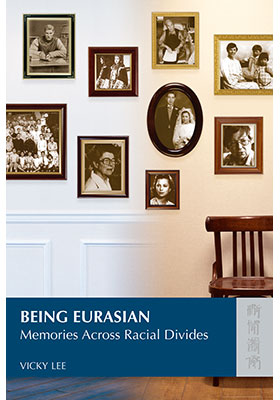Being Eurasian
Memories Across Racial Divides
(生為歐亞混血兒:跨種族的記憶)
ISBN : 978-962-209-670-7
August 2004
296 pages, 6″ x 9″
Ebooks
Also Available on
What was it like being a Eurasian in colonial Hong Kong? How is the notion of Eurasianness remembered in some Hong Kong memoirs? Being Eurasian is a description and analysis of the lives of three famous Hong Kong Eurasian memoirists, Joyce Symons, Irene Cheng and Jean Gittins, and explores their very different ways of constructing and looking at their own ethnic identity.
‘Eurasian’ is a term that could have many different connotations, during different periods in colonial Hong Kong, and in different spaces within the European and Chinese communities. Eurasianness could mean privilege, but also marginality, adulteration and even betrayal. Eurasians from different socio-economic sectors had very different perceptions of their own ethnicity, which did not always agree with their externally prescribed identity. Being Eurasian explores the ethnic choices faced by Hong Kong Eurasians of the pre-war generation, as they dealt with the very fluidity of their ethnic identity.
“Alive with little-known insights into a now mostly vanished world, Being Eurasian has done much to document the stories, and so help return the memory of Hong Kong’s Eurasian community to present-day readers. This fascinating account of life in a very different time and place is to be enjoyed for its colour and insight and treasured as a valuable record for the future, particularly as both this unique people, and the historical circumstances that created them, are inexorably vanishing into the past.” —Jason Wordie, Hong Kong-based historian and journalist
“In this original study of Hong Kong Eurasian women memoirs, Lee looks at how, collectively, these women’s stories cross two world empires, and a social and political matrix that occupied the entire energetic twentieth century. Alert to race, gender, and national issues, Lee views Eurasian identity in Hong Kong as a marginal, situational, unfixed construction in which family and social conditioning play out with contingent circumstances and subjective choices to produce remarkable female lives. A valuable contribution to overlooked yet intriguing personal histories.” —Shirley Geok-lin Lim, Professor of English, University of California, Santa Barbara



